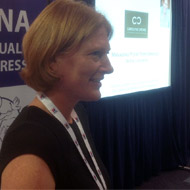Managing poor performance

Carolyne Crowe.
In an enlightening presentation during Friday afternoon at the BVNA Congress in Telford, veterinary coach and mentor, Carolyne Crowe, shed some light on the reasons why teams often fail as a consequence of inappropriate communication.
"Always look at yourself as well as the other person; and treat others as they want to be treated and not according to the old mantra of 'treating others as you would wish to be treated yourself'", she said. "Reflect on your differences and adapt your communication style to suit that of the other person."
Carolyne recommended the application of the DISC (dominance, influence, steadiness, compliance) profiling technique in managing apparent poor team performance or the emergence of a "difficult member" of the team. It recognises that people are different and offers an accurate insight into how people behave at work, under pressure and at home. In any team you will want a combination of styles.
D style is Outgoing & Task orientated. People in this category will focus on getting things done, will take risks and are direct in their communication style – which latter can be misinterpreted as being abrupt and dictatorial. These team members like to be in charge and to control. Their greatest fear is fear of failure.
I style is Outgoing & People orientated. People in this category are often inspiring and good communicators who are influential, impulsive, but lack follow-through. You know how they feel at any one time because they tell you, they are interested in people, especially in a big group environment, and want to be liked. Their greatest fear is loss of popularity and rejection – they are motivated by praise and can be excellent facilitators of change.
S style is Reserved & People oriented. Members of this group are very interested in people, sensitive and supportive. They internalise their feelings, can seem stubborn, yet invariably provide the 'team glue'. They need to know the reasons behind any proposed changes before implementing them and their greatest fear is loss of security and change.
C style is Reserved & Task oriented. These people are cautious, conscientious and calculating, who show great attention to detail and want to deliver to a high standard. They are often self-critical, set high standards and have difficulty handling negative events and feedback. Their greatest fear is criticism and they are motivated by detail.
Conflicts can occur within a team because of the differences between these fundamental operating styles – the highest potential for conflict being between Outgoing styles and Reserved styles. So in a team context it is always important to work out the DISC profile of each individual member and keep this at the back of your mind at all times.
The secret of success lies in trying to empower team members within all the different DISC profiles by offering them "autonomy, mastery and purpose".
If you would like to find out more about DISC profiling or could do with some help in your practice, contact carolyne@carolynecrowe.co.uk



 The Federation of Independent Veterinary Practices (FIVP) has announced a third season of its podcast, Practice Matters.
The Federation of Independent Veterinary Practices (FIVP) has announced a third season of its podcast, Practice Matters.